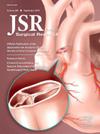Efficient Free Flap Monitoring—A Single-Center Study Comparing Different Monitoring Periods
IF 1.8
3区 医学
Q2 SURGERY
引用次数: 0
Abstract
Introduction
Postoperative monitoring is an important part in the complex process of reconstructive microsurgery. While it can improve quality and outcome of microsurgical reconstructions, it is also very resource intensive. The aim of this study was to investigate the effectiveness of postoperative flap monitoring.
Methods
In this study, we analyzed outcomes and complications after microsurgical reconstruction. The initial postoperative monitoring period was operation day and the following five postoperative days with clinical evaluation every 2 hs. Following initial evaluation of 124 cases, we modified our postoperative monitoring scheme toward a shorter monitoring period. After performance of further 100 free flaps, outcomes of the two monitoring schemes were analyzed in depth and compared retrospectively.
Results
Eighty-nine percent of complications with the need of revision occurred within the operation day and the following 3 ds postoperatively. Total flap loss was 6.5%. Flap salvage rates after revision were 50-80% in this period. Flaps that had a later revision could not be saved (n = 2). The optimized monitoring protocol includes a clinical examination on the day of surgery and for the three postoperative days. In the event of intraoperative complications, the senior surgeon could extend postoperative monitoring to five postoperative days, which was decided for in four cases. After optimizing the protocol, total flap loss was 3%. Flap salvage rates after revision varied between 33% and 100%.
Conclusions
Flap monitoring is crucial for maximizing the salvage rate in microsurgical reconstruction. Optimizing our monitoring protocol toward a shorter postoperative monitoring period in our cohort did not lead to an increased complication rate while saving resources.
求助全文
约1分钟内获得全文
求助全文
来源期刊
CiteScore
3.90
自引率
4.50%
发文量
627
审稿时长
138 days
期刊介绍:
The Journal of Surgical Research: Clinical and Laboratory Investigation publishes original articles concerned with clinical and laboratory investigations relevant to surgical practice and teaching. The journal emphasizes reports of clinical investigations or fundamental research bearing directly on surgical management that will be of general interest to a broad range of surgeons and surgical researchers. The articles presented need not have been the products of surgeons or of surgical laboratories.
The Journal of Surgical Research also features review articles and special articles relating to educational, research, or social issues of interest to the academic surgical community.

 求助内容:
求助内容: 应助结果提醒方式:
应助结果提醒方式:


